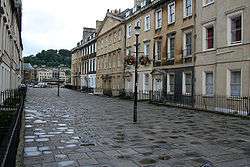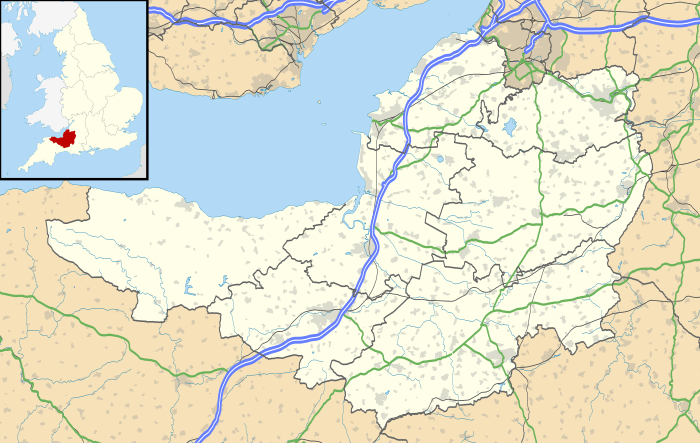Duke Street, Bath
| Duke Street | |
|---|---|
 | |
| Location | Bath, Somerset, England |
| Coordinates | 51°22′49″N 2°21′20″W / 51.38028°N 2.35556°WCoordinates: 51°22′49″N 2°21′20″W / 51.38028°N 2.35556°W |
| Built | 1748 |
| Architect | John Wood, the Elder |
Listed Building – Grade I | |
| Official name: Nos 1 & 2 (Georgian House), Nos 3, 4 & 5 (Part of Southbourne Hotel) | |
| Designated | 12 June, 1950[1] |
| Reference no. | 442544 |
Listed Building – Grade I | |
| Official name: Nos 6 to 11 | |
| Designated | 12 June, 1950[2] |
| Reference no. | 442545 |
 Location of Duke Street in Somerset | |
Duke Street in Bath, Somerset, England was built in 1748 by John Wood, the Elder. Several of the buildings have been designated as Grade I listed buildings.[1][2] The street, which overlooks the River Avon, is pedestrianised with no vehicles permitted to enter.
Duke Street was part of a wider scheme to build a Royal Forum, including South Parade, Pierrepont Street and North Parade, similar to Queen Square, which was never completed. Wood designed the facade, of Bath stone, after which a variety of builders completed the work with different interiors and rear elevations. Many of the buildings are now hotels whilst some remain as private residences.[3]
Numbers 1 and 2 are known as the Georgian House, and numbers 3, 4 and 5 form part of the Southbourne Hotel.[1]
The last house, number 14, adjoins number 14 North Parade.
See also
References
- 1 2 3 "Nos 1 & 2 (Georgian House), Nos 3, 4 & 5 (Part of Southbourne Hotel) Duke Street". Images of England. English Heritage. Retrieved 2009-07-26.
- 1 2 "Nos 6 to 11 (consec) Duke Street". Images of England. English Heritage. Retrieved 2009-07-26.
- ↑ "Bath World Heritage Site Management Plan" (PDF). Bath and North East Somerset Council. Retrieved 2010-11-10.